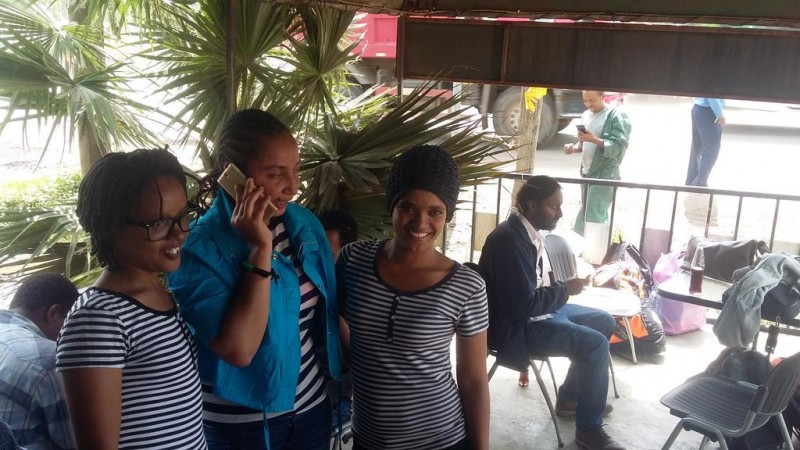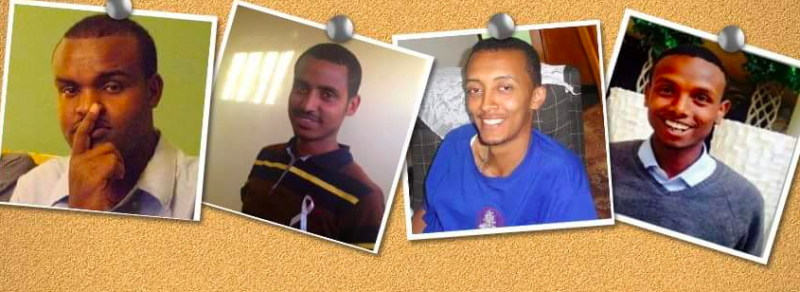
Edom Kassaye, Reeyot Alemu and Mahlet Fantahun, all released from prison on July 9, 2015. Photo posted on Twitter by Fisseha Fantahun.
Global Voices Advocacy's Netizen Report offers an international snapshot of challenges, victories, and emerging trends in Internet rights around the world.
Five journalists and bloggers jailed in Ethiopia on terrorism accusations were released on July 8 and 9 and cleared of all charges. Among those freed were members of Zone9, an Addis Ababa blogging collective known for its critical coverage of government policy and practice through a human rights lens.
The collective was paralyzed in April of 2014 when nearly all of its local participants were arrested and eventually charged under the country’s Anti-Terrorism Proclamation. Several of the Zone9 bloggers wrote and collaborated with Global Voices and led Global Voices’ Amharic language site.
Also released on July 9 was journalist Reeyot Alemu, who was convicted under the Anti-Terrorism Proclamation and had spent four years in prison, where she was subject to inhumane treatment that left her in increasingly poor health.
 Four of the bloggers remain behind bars. It appears that the government’s case against them — in which they face charges of terrorism, inciting social unrest via online means, and accepting funding from a foreign entity — will continue.
Four of the bloggers remain behind bars. It appears that the government’s case against them — in which they face charges of terrorism, inciting social unrest via online means, and accepting funding from a foreign entity — will continue.
What caused the sudden change of course by Ethiopian authorities? Supporters including Global Voices and large media freedom organizations like the Committee to Protect Journalists have pressed for the bloggers’ freedom for many months, to no avail. Many reckoned that the release was prompted by an upcoming visit to Ethiopia by Barack Obama. Global Voices Nigeria author Nwachukwu Egbunike tweeted:
Obama should visit Ethiopia more often. Just heard that Reeyot Alemu has been released from prison! #Obamascare #FreeZone9Bloggers
— Nwachukwu Egbunike (@feathersproject) July 9, 2015
The question now on many supporters’ minds is, will President Obama urge Ethiopian authorities to release all of the journalists who remain in prison? As one Twitter user put it, “we will keep on tantrumin out here until they set all prisoners out there in #Ethiopia free.”
Venezuela defends censorship, blames Internet outages on protesters
Venezuela’s telecommunications regulator CONATEL told a delegation from the UN Human Rights Committee that it is “legally” blocking 1060 websites. The Committee is investigating whether Venezuela has breached the International Covenant on Civil and Political Rights. CONATEL also commented on an Internet outage in the state of Tachira during February 2014 protests, blaming it on “violent groups” cutting fiber cables in the region. The regulator’s comments are consistent with the evaluations of Global Voices author Marianne Diaz, who writes:
…there is no coherent policy for online content regulation in Venezuela, and censorship tends to come in waves. This inconsistency may in the end lead users to censor themselves out of concerns for their safety.
Arab human rights defenders hack into the Hacking Team hack
Human rights advocates across the Arab world are combing through the troves of data uncovered in last Sunday's massive hack of the controversial Italian surveillance technology firm Hacking Team. Oppressive regimes in Saudi Arabia, Bahrain, Sudan, UAE, Oman, Morocco and Egypt have spent hundreds of thousands of Euros on Hacking Team products, including the now notorious “Remote Control System,” which allows the attacker to copy files from a computer’s hard disk, record Skype calls, e-mails, and passwords, among other things.
Leaked data confirm that governments have used these tools to surveil and intimidate human rights advocates, journalists, and digital activists. Egyptian digital activist Ramy Raoof pointed out that the hack has confirmed what activists suspected for a long time:
rights groups knew #Egypt using #HackingTeam spyware since 2012; Sunday's hack just proved it http://t.co/UiqP2z9ZQl
— Ramy Raoof (@RamyRaoof) July 7, 2015
For anyone wanting to learn more about the technology behind Hacking Team’s products, the research of the University of Toronto's Citizen Lab is a must-read.
Did Russia’s “Right to Be Forgotten” just lose a tooth?
Russian legislators passed amendments to its version of a “Right to Be Forgotten” bill, narrowing the scope of the legislation by requiring that people provide specific hyperlinks to be removed rather than requesting the removal of information about a particular issue or event, a stipulation that shifts the burden of proof of accuracy from the search engine to the applicant. RuNet Echo’s Kevin Rothrock authored a comparison between the new Russian legislation and the European Court decision.
On Kenya’s public WiFi networks, everyone will know your name
Kenya plans to require all users of public wifi to register with the government and all Internet cafe owners to maintain records of all users of their service, in a new set of rules intended to combat cybercrime. Kenyan businesses will also be required to host their websites within Kenya, apparently to “avoid extra costs associated with sending data out to a different location and back again to the website owner,” according to the Daily Nation. Although the policy speaks to a legitimate set of challenges concerning telecommunications regulatory regimes in the region, the web hosting requirement could lead to increased controls on content and user activity in the country.
EU continues to waver on net neutrality
Europe may bring an end to net neutrality principles by allowing fast lanes for “Internet TV and new innovative applications” in its planned new telecommunications policy. While the rules would enshrine net neutrality in EU law for the first time, the carve-out for ‘Internet TV’ would mark a significant accommodation much like the fast lanes considered – and rejected – by the American FCC last year.
Chinese tech industry wary of backdoor requirements
The Chinese government has called for a “national security review” of the technology industry, generating concern among industry groups that companies may soon be required to build backdoors in their products that would allow law enforcement to access user data.
Lawsuit against Facebook backfires in Austria
An Austrian court rejected the largest privacy class-action suit to be brought against Facebook to date. Law student Max Schrems collected around 60,000 signatures in support of the suit, which focused on how Facebook collects and utilizes data on its users. Schrems plans to appeal the decision by mid-July, arguing that Facebook is in violation of European privacy rules.
Anonymous blames Canada, attacks state sites over new anti-terror law
Anonymous claims to have orchestrated a coordinated DDoS action on July 1, in protest of Canada’s recently-passed anti-terror law, Bill C-51. Several Canadian government websites were taken offline during the attacks, including Canada.ca and sencanada.ca. Members of the #OpCyberPrivacy team told VICE News “This bill violates the charter of rights and freedoms,” and that while they expect blowback for the attacks, they thought it was worth the risk. Canada’s Privacy Commissioner Daniel Therrien says the bill “opens the door to collecting, analyzing and potentially keeping forever the personal information of all Canadians.” But the use of DDoS to shut down sites in protest remains a controversial tactic.
Ellery Roberts Biddle, Marianne Diaz Hernandez, Abir Ghattas, Weiping Li, Hae-in Lim and Sarah Myers West contributed to this report.



